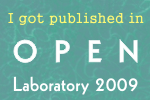There has been a lot of discussion recently on this blog and others on the need for robust scientific software. Most of the discussion I have been involved in comes from bioinformaticians, because, well, I am one. There has been plenty of talk about code robustness, sharing, and replicability vs. reproduciblity. I do not want […]
So there was a lot written over the blogosphere, twittersphere and what-have-you-sphere about the to publish code in scientific research. The latest volley was fired from a post at biostars.org from “JermDemo” which also mentioned my post on making accountable research software by forming a volunteer “Bioinformatics Testing Consortium”. (My post, not my idea). I won’t […]
My previous post on ROSALIND, a bioinformatics learning site, got picked up by the Slashdot community. A discussion came up on careers in Bioinformatics, and the Slashdot user rockmulle made some interesting observations on career paths in bioinformatics, which I have copied here. While brief and therefore omitting many important details (research at a university […]
I just learned about this one: ROSALIND is a really cool concept in learning bioinformatics. You are given problems of increasing difficulty to solve. Start with nucleotide counting (trivial) and end with genome assembly (not so trivial). To solve a problem, you download a sample data set, write your code and debug it. Once […]
Improve wikipedia entries in computational biology, and you too can win cash prizes, a free membership to International Society of Computational Biology, or a dinner date with an ISCB officer of your choice! OK, maybe not the last one, but definitely the first two. The ISCB is announcing a competition to improve Wikipedia entries that have to […]
I recently read this post about lacunae in Bioinformatics. One complaint was: I know that documentation is a thankless task. But some parts of the Bio[Java|Perl|Python] libraries are described only as an API? This became apparent to me when I had to teach the libraries to students. What does this module do and why does it do […]
So there have been a few reactions to my latest post on accountable research software, including a Tweeter kerfuffle (again). Ever notice how people come out really aggressive on Twitter? Must the the necessity to compress ideas into 140chars. You can’t just write “Interesting point you make there, sir. Don’t you think that your laudable goal would […]
Preamble: this post is inspired by a series of tweets that took place over the past couple of days. I am indebted to Luis Pedro Coelho (@LuisPedroCoelho) and to Robert Buels (@rbuels) for a stimulating, 140-char-at-a-time discussion. Finally, my thanks (and yours, hopefully) to Ben Temperton for initiating the Bioinformatics Testing Consortium. Science is messing around with […]
The Uncanny Valley Every day, software appears to do more things that we thought were exclusively in the human realm. Like beating a grandmaster in chess, or carrying out a conversation. I say “appears” because there is obviously no self-aware intelligence involved, as this rather bizarre conversation between Cleverbots demonstrates. For humans, playing chess and carrying […]
Scientific Curator – Bioinformatics Interested individuals should apply on-line at www.jax.org/careers, referring to job posting #3256. Contact Jeannine Ross at ext. 6045 with questions. The incumbent in this position plays a critical role in data annotation and curation for the Gene Ontology (GO) and Protein Ontology (PRO) programs at The Jackson Laboratory in Bar Harbor […]
Here is a study that looked for a type of genes that the authors felt was neglected by classic genomic annotation. The research shows how to employed concepts in molecular evolution to validate the existence of these genes. Some background: the first question we ask after assembling a genome is: “where are the genes”? Not […]
NSF grant funded, woohoo! Now I am hiring a programmer. So if you want to be part of a dynamic, growing lab, do lots of interesting stuff and upgrade yourself from just a great bioinformatician to a super-bioinformatician, this job’s for you. You’ll be working primarily on microbial genome evolution, including setting up a kick-butt […]
I just received an email from Julian Gough , one of last year’s CAFA participants. He started a Wikipedia initiative on protein function prediction, which are barely stubs at the moment. EDIT: He alerted me to the fact that protein function prediction has virtually no presence on Wikipedia. So all you protein function predictors out there, please contribute. Yes, […]
If you have a merged file of paired-end reads, here is a quick way to read them using Biopython: from Bio import SeqIO from itertools import izip_longest # Loop over pairs of reads readiter = SeqIO.parse(open(inpath), “fastq”) for rec1, rec2 in izip_longest(readiter, readiter): print rec1.id # do something with rec1 print rec2.id # do something […]
Good news: Press Release 2011-10-03 The Nobel Assembly at Karolinska Institutet has today decided that The Nobel Prize in Physiology or Medicine 2011 shall be divided, with one half jointly to Bruce A. Beutler and Jules A. Hoffmann for their discoveries concerning the activation of innate immunity and the other half to Ralph M. Steinman […]





